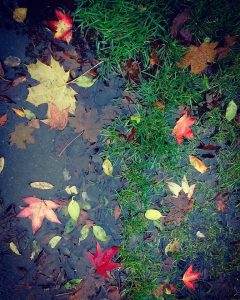This Week’s Bits of String: An unknown 14-year-old’s thoughts on street art
Having established that both art and the empathy it enables can be excruciating processes, the next question is: What do we get out of it? This question reminds me of Dulcinea begging Don Quixote to explain himself in The Man of La Mancha. And the analogy makes sense. Writers and artists tilt at windmills when we try to draw beauty and order from the sticky marrow of reality. It’s a difficult job. Why do we insist on dreaming this impossible dream?
A Noble Reason: Resounding Into the Chaos

Julia Bell, in a piece for The Guardian about the ability of books to change the world, quotes Salmon Rushdie: “If literature is not an argument with the world then it is nothing.”
Arguments aren’t pretty things. But sometimes, making art or writing literature doesn’t mean inserting beauty onto a blank page or canvas. Instead, it can mean creating depth, and to accomplish this, we must guide readers through dark places, and alert them to some ugly monsters.
Working as a teaching assistant, I once found a scrap of paper in an Art classroom. It was a copy of a questionnaire assignment Year 9s devised on the ethics of street art. One of the questions was: ‘Do you think Banksy is doing the right thing?’ and the anonymous respondent had scrawled, ‘Absolutely not! But neither is anyone else!’
These kids are on to us.
In other words, even with the edgiest art forms, we aim to project intent into a seemingly cruel, random world. Sometimes the intent, as with post-modern authors like Kafka, is to expose the chaos by reflecting it. Other writers, from Charles Dickens to Alice Walker, reminded society to uplift those being trampled in the disorder. The current ‘Own Voices’ books campaign continues this quest today, as more people seek out stories from LGBTQ authors, ethnic and racial minorities, and people with disabilities. Support this exciting movement by checking out this list on Goodreads and choosing a few books for your Christmas list.
A Possibly Less Noble Reason: Grabbing Attention

We also do it because we want to be heard, even those of us with the privilege not to be in a minority or disenfranchised group. Stories may be fictionalised, often wildly, but the emotions they draw on are real, and perhaps, in our humble opinions, heretofore neglected. I love Esther’s thought in Sylvia Plath’s The Bell Jar: “Then I decided I would spend the summer writing a novel. That would fix a lot of people.”
We tell ourselves that our acts of creation will at least avenge, at most remedy, the ways in which the world tries to destroy our spirit.
One of my favourite motivations for writing is to resuscitate memories of people and places I no longer get to see. Putting versions of them in stories allows me to keep hold of what time snatches away. As the protagonist, Helen, exhorts her students in my novel Artefacts:
‘Let’s write, and mine the glimmers inside that might turn out to be gems. Whether it’s people we love, or the feeling of playing a sport really well, or a place we visit that makes us feel free, let’s use those to defend ourselves.’